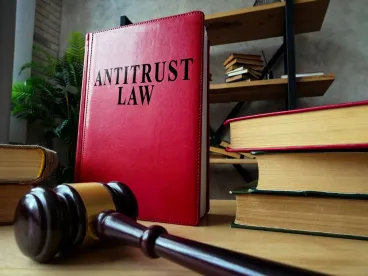On August 16, 2023, the Federal Trade Commission took action to resolve its antitrust concerns associated with a proposed transaction between EQT Corporation (EQT) and private equity firm QEP Partners, LP (Quantum) pursuant to which EQT agreed to acquire certain of Quantum’s upstream and midstream natural gas interests located in the Appalachian Basin in exchange for approximately $2.6 billion in cash and up to 55 million shares of EQT common stock, along with the right to an EQT board seat. According to Nathan Soderstrom, Acting Deputy Director of the FTC’s Bureau of Competition, the transaction as proposed “would have resulted in an illegal interlocking directorate, facilitated the exchange of confidential and competitively sensitive information, and otherwise stifled competition in the Appalachian Basin.”
EQT is the largest natural gas producer in the Appalachian Basin and in the US. Quantum and its affiliates either directly control or indirectly own interests in a variety of energy companies that acquire and lease mineral rights and produce and sell natural gas within the Appalachian Basin, including the entities to be sold to EQT – THQ Appalachia I Midco, LLC (more commonly known as “Tug Hill”), a natural gas producer, and THQ-XcL Holdings I Midco, LLC (more commonly known as “XcL Midstream”), a natural gas gatherer and processor.
Notably, the FTC did not take issue with EQT’s proposed acquisition of Tug Hill and XcL Midstream. Rather, it focused on the deal structure and the fact that Quantum would remain a rival to EQT in the production and sale of natural gas in the Appalachian Basin following the transaction.
Specifically, Quantum’s receipt of up to 55 million shares of EQT stock would make Quantum one of the largest shareholders in a major competitor. Thus, the FTC concluded that this arrangement could facilitate the illegal exchange of confidential and competitively sensitive information and participation in or influence over each other’s strategic decisions, constituting an unfair method of competition in violation of Section 5 of the FTC Act.
Additionally, the FTC determined that Quantum’s right to an EQT board seat would create a board interlock among competitors in violation of Section 8 of the Clayton Act and Section 5 of the FTC Act. Section 8 of the Clayton Act prohibits an officer or director of one firm from also serving as an officer or director of a competing business, unless certain de minimis thresholds are met. While the Department of Justice has sought to pursue multiple violators of Section 8 in recent months (just last week it announced that two directors of Pinterest Inc. had resigned their positions on the board of directors of Nextdoor Holdings Inc. in response to a DOJ investigation), this marks the first time in nearly 40 years that the FTC has formally sought enforcement of Section 8.
Significantly, not only does the FTC’s consent order require Quantum to sell its EQT shares (by a non-public date certain) and forego its right to a seat on EQT’s board − Quantum is also prohibited from taking a seat on the boards of any of the top seven natural gas producers located in the Appalachian Basin without prior FTC approval.
This case is also the first application of Clayton Act Section 8 involving an entity that is not a corporation (such as limited partnerships and limited liability companies). Traditionally, Section 8 has only been applied to corporations, as the statute itself refers to the prohibition of interlocks among competitor “corporations.”[1] However, according to FTC Chair Lina M. Khan, in her statement issued with the announcement of the proposed consent order, Section 8 pre-dates the development of now commonly used LP and LLC structures and the application of the law needs to be updated to reflect how firms do business today. This case “puts industry actors on notice that they must follow Section 8 no matter what specific corporate form their business takes.” The FTC previously put parties on notice that this type of conduct violates the “spirit of the antitrust laws” in its November 2022 Policy Statement Regarding the Scope of Unfair Methods of Competition Under Section 5 of the Federal Trade Commission Act, where it specifically stated that Section 5 prohibits “interlocking directors and officers of competing firms not covered by the literal language of the Clayton Act.” This case marks the first time where such conduct has been addressed under both statutes.
This settlement is also noteworthy because the FTC took issue with a separate existing business relationship between the parties, unrelated to the proposed acquisition. In 2020, EQT and Quantum formed a joint venture, The Mineral Company (TMC), dedicated to purchasing mineral rights in the Appalachian Basin to be operated by EQT. Quantum supplied most of the funding, and in return, EQT was to provide a right of first refusal to TMC before acquiring mineral rights. The FTC identified Quantum’s ability to access EQT’s confidential business information (its mineral acquisition and future drilling plans) via TMC as an additional unfair method of competition in violation of Section 5 of the FTC Act. The FTC highlighted that the risks to competition were exacerbated in this case due to the “dense and tangled web of co-investments, joint operations, and other methods of collaboration, between and among natural gas producers and investors in the Appalachian Basin and across the country.” The parties were ordered to immediately unwind TMC, and the consent order imposes further limitations on future arrangements between EQT and Quantum.
In addition to setting an important precedent regarding interlocking directorates under Section 8 of the Clayton Act, this case demonstrates that even though an acquisition may not itself raise competitive concerns, the antitrust agencies can and will look at the entirety of the transaction structure as well as other business relationships between the buyer and seller.
[1] See 15 U.S.C. §19.




 />i
/>i

